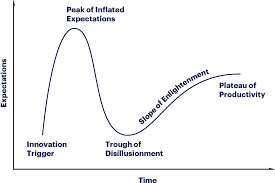Oct
2018
Hype Cycle: Where does Tumblr fall?
Gartner’s Hype Cycle is a pictorial representation of the life cycle stages that happen in technology. These stages mark the different periods, from conception to maturity and then widespread adoption. “[The] hype cycle’s stages are often used as reference points in marketing and technology reporting. Businesses can use the hype cycle to guide technology decisions in accordance with their level of comfort with risk.” (WhatIs) The five stages are 1) Technology Trigger, 2) Peak of Inflated Expectations, 3) Trough of Disillusionment, 4) Slope of Enlightenment, and 5) Plateau of Productivity. 
Based on Garnet’s Hype Cycle, I would say that Tumblr falls on the Plateau of Productivity. The site has undergone most of the significant change that it is most likely going to make unless they decide to do a massive overhaul of the design. As a user myself, I have had a Tumblr account since 2011, roughly four years after conception. Over time, not much at all has changed with the interface. While this is good for loyal users like me, who are fine with this design, this is not good for potential new users, as they don’t have any new features to lure them in.
Going through the five stages, Tumblr has long since passed its’ “Technology Trigger” phase. This phase occurred in 2007 and earlier, in the beginning, stages of the site. Tumblr’s “Peak of Inflated Expectations.” The peak of this stage can be seen in 2014, where growth was at its’ top. From there Tumblr rapidly falls into its “Trough of Disillusionment,” where growth rapidly begins to fall from 2014 to now, 2018. This growth was 32.8% and fell to just 6.5% in 2018. Tumblr’s “Slope of Enlightenment” came in recent years in that the number of active Tumblrs steadily has grown. This cannot be seen as an increase in overall users, however, because users can have more than one Tumblr to their account. Based on this information thus far, I would say that Tumblr is in it’s Plateau of Productivity. While there are some increasing numbers, overall Tumblr is pretty stagnant, especially compared to power players like Twitter.